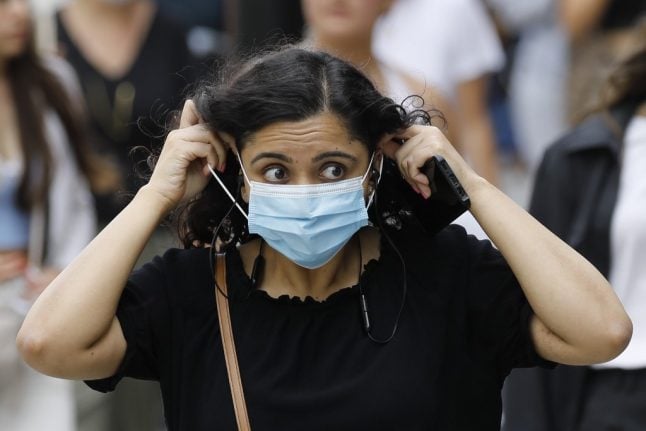NOTE: This report was last updated on October 13th, 2020. Switzerland imposed a nationwide set of mask rules on October 29th. Click here for more information.
Switzerland's federal system – with nationwide rules as well as the laws of each of the 26 cantons – can make it difficult to work out what applies where.
Here is an overview of where masks are now mandatory.
Please consult federal and cantonal authorities for official information.
Public transport
On the national level, everyone over the age of 12 must be masked on all public transport, including train, bus, tram, metro, funicular, ski lift, boat or ferry.
Masks are also compulsory at protests and demonstrations.
These are the only two requirements that are applied nationally; the following ones are enforced on cantonal basis.
Shops and supermarkets
As at October 13th, 12 cantons have decided that masks will be required in shops and supermarkets in their cantonal boundaries: Zurich, Zug, Basel City, Bern, Geneva, Fribourg, Valais, Solothurn, Ticino, Neuchâtel, Vaud and Jura.
Two more – Schaffhausen and Schwyz – will require masks from October 16th.
In Schwyz, while the mask rule applies to shops and supermarkets – along with cinemas, post offices and places of worship – it will only apply where minimum distance cannot be kept.
Bars and restaurants
Masks are also required in restaurants and bars in Geneva, Jura, Vaud, Basel City and Bern.
Zurich put in place a mask requirement in bars and restaurants from October 15th, unless the bar or restaurant is seated only.
In Schwyz, while the mask rule applies to bars, it will only apply where minimum distance cannot be kept.
Staff at bars and restaurants are required to wear masks in Zurich, Zug, Jura, Basel City, Ticino and Fribourg.
Clubs, events and discos
Cantons of Basel Country, Bern, Zurich, Aargau, Zurich, Solothurn and Basel City, require guests to wear a mask in discos and clubs.
In Schwyz, masks will be required at all public and private events with more than 50 people.
Clubs are closed in Geneva.
Aeroplanes
SWISS made masks compulsory on all its flights from July 6th, before the federal government extended it to all airlines on August 15th.
Children 6 and over and all adults will have to wear face masks on all European flights. The EU Transport Ministers reached agreement on various health measures to be imposed on board aircraft flying over the continent, including mandatory mask requirements.
Masks are required in Geneva Airport from Tuesday, July 28th.
What about schools?
Masks have been made compulsory in high schools and vocational education centres in the western canton of Neuchâtel.
Neuchâtel has followed the lead of Lucerne and Geneva in requiring masks in schools, although unlike Lucerne students do not have to pay for their own masks.
Neuchâtel State Councilor Monika Maire-Hefti told Le Temps “Wearing a mask will be compulsory in post-compulsory education, if one cannot respect 1.5 meters of distance”.
READ: Everything you need to know about Switzerland's new compulsory mask requirement
In practice, Le Temps reports that masks will be compulsory inside all high schools and vocational centres in Neuchâtel as distance requirements will be difficult to comply with.
Masks will not compulsory outside, while Maire-Hefti also said “”in some workshops that are large enough, however, the students should not wear them.”
The canton has ordered 120,000 masks for students to wear in order to comply with the requirement.
From August 31st, masks will be required at universities in Fribourg and from October 12th in Bern.



 Please whitelist us to continue reading.
Please whitelist us to continue reading.
Basel Stadt Masks compulsory in shops 24th August.